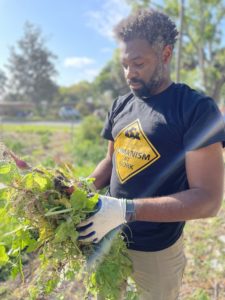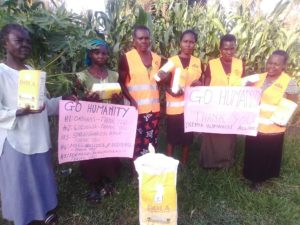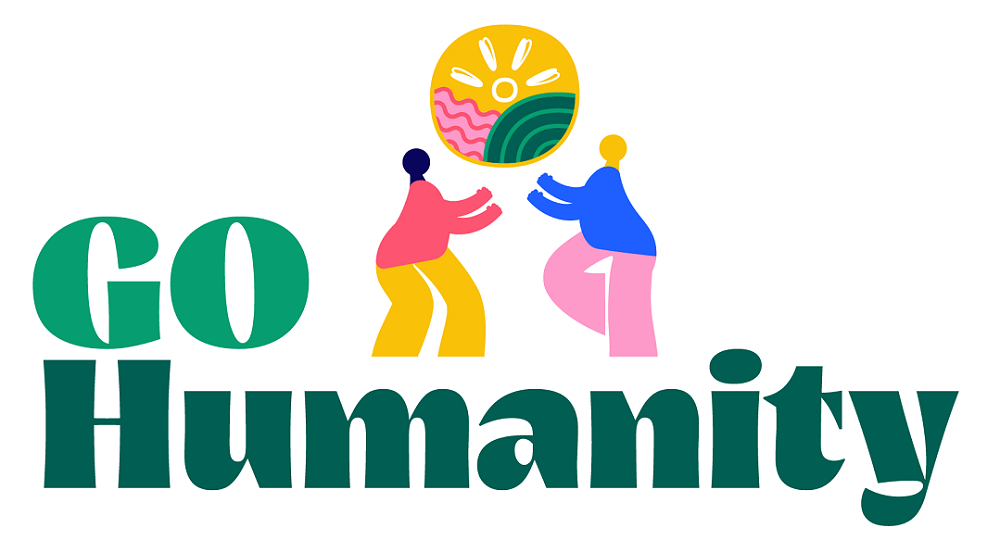GO Humanity: Creating the Infrastructure for Human Responsibility
 GO Team North Orlando Oasis rescues food from local farms to deliver to shelters and runs a mutual aid garden to local improve food security.
GO Team North Orlando Oasis rescues food from local farms to deliver to shelters and runs a mutual aid garden to local improve food security. At its core, humanism is a philosophy of human responsibility. Humanists understand that humanity is just a tiny blip of precious life in an incomprehensibly large universe that is indifferent to our survival. If we want to experience good health, safety, love, and fulfillment as individuals and as a human family, we are responsible for working together to make that happen. And as a philosophy of responsibility, humanism cannot be passive or merely theoretical—there is real work to be done. The impacts of our failure to take this collective responsibility seriously as a species have heavy consequences.
Despite the abundance of food on our planet, in the United States alone fifteen percent of all households are food insecure—meaning 38.3 million people lack consistent access to enough food for an active, healthy life. These numbers are even worse for Black and Hispanic households, which underscores our inability to face the myriad ways racism impacts opportunity and well-being in this country.
Despite a wealth of proven scientific information about how to slow and even stop the spread of COVID-19, more than 1.01 million people in the United States have lost their lives to the virus. Again, these numbers disproportionately affect racial and ethnic minorities.

During Winter Storm Uri, five GO Teams across Texas provided hotel rooms, tents, sleeping bags, food, and toiletry kits for unhoused people.
And despite the mind-boggling amount of research definitively detailing the deadly impact carbon-fueled capitalism has on our planet, our species continuously fails to act at the scale necessary to mitigate this catastrophe. Extreme climate events are already increasingly destroying lives: in 2020, more than 30 million people were displaced fleeing storms, floods, wildfire, drought, or heat waves, with numbers expected to dramatically worsen in the coming years. Worse still, carbon-induced climate change is rendering the planet unlivable for a third of all species in the next fifty years and putting humanity’s survival in grave peril as well.
These are not small problems. The scale of the challenges we face require those of us who adopt a lifestance of human responsibility to come together to shift culture away from individualism and exploitation and toward collectivism and shared power—toward humanism. A philosophy of responsibility needs an infrastructure; we need systems of cooperation, avenues to pool our talents and our resources, and a foundation on which to build a world where humanity flourishes.
In 2009, the humanist community came together to address two key areas in which humanists lacked this infrastructure: philanthropy and service. While individuals and small groups in our movement have always participated in giving and volunteerism, that scale was too small to meet the challenges of our time. Author and humanist thought-leader Dale McGowan spearheaded the launch of a foundation that would provide structures of support for living humanist values and amplify our collective generosity. Originally branded as Foundation Beyond Belief, this uniquely humanist charity offered members an opportunity to support a variety of vetted nonprofits that met humanistic standards of secularism, sustainability, evidence-based solutions, cultural responsiveness, and nondiscrimination. To date, the organization has given more than $3.86 million in grants to charities that put humanist values into action all over the globe!
The success of the foundation was heartening, yet even as grants were funneled to worthy projects, the lack of existing secular organizations filling the needs of the most vulnerable people was apparent. In the United States, a full third of all charitable giving goes to religious congregations, with religion dominating the philanthropic landscape. If we are going to shift culture toward human responsibility, we need more support for communities and organizations that do not leave the care of humanity in the hands of a supernatural ideal.

GO Team Kenya Humanist Alliance supports Kenyans living in poverty by sharing nutritious food, clean water, education, and other necessities.
In August of 2011, as part of an effort to buoy the work of local groups putting humanistic values into action, Foundation Beyond Belief launched a service network with five volunteer teams. It was immediately evident that direct local service met community needs most efficiently, sustainably, and in culturally responsible ways. Today, this international service network includes nearly 100 teams around the world that have together donated more than 256,133 volunteer hours!
Continuing this approach, in 2016, Foundation Beyond Belief launched a direct service-based disaster recovery program with a deployment to South Carolina following a 1 in 1,000 year flooding event. Since then, the organization has responded to dozens of disasters worldwide and raised hundreds of thousands of dollars in recovery funds. With the growth of its local service network, there is now an opportunity to begin investing in permanent disaster resiliency teams and equipping them with resources to both prevent and respond to disasters in their own communities. In collaboration with the American Humanist Association (AHA), a pilot disaster resiliency program will launch later this year beginning in key Federal Emergency Management Agency (FEMA) regions.
In 2021, as the economic fallout from the COVID-19 pandemic lingered, Foundation Beyond Belief launched an ambitious new program to tackle food insecurity through the thriving service network. With monthly grants supported by humanistic donors, the pilot Food Security Project teams are organizing food distribution programs in their communities, planting community gardens, and creating programs tailored to the unique needs of food insecure people in their regions. The project is ready to move out of the pilot phase and begin adding additional teams in underserved areas this summer.
The success and impact of this direct service work has grown incredibly since the launch of those first five teams back in 2011. The infrastructure of human responsibility is becoming a resilient framework upon which we can build a more humanist tomorrow.
As Foundation Beyond Belief headed into 2022, it was evident that the old “foundation” moniker no longer said enough about how active, engaged, diverse, and inclusive the work of the organization had become. Last month, as part of the charity’s 13th birthday celebration, a more fitting name was unveiled:

GO Humanity’s new logo, designed by Simon Sotello at Weird Wonderful Design Studio, is a visual representation of many hands building one beautiful world.
GO Humanity: Giving and Organizing for Humanity.
GO Humanity’s mission remains the same: to end poverty and hunger, promote good health and well-being, and foster employment opportunities and economic growth in ways that exemplify humanist values. GO Humanity accomplishes this by supporting the collective action of service teams and organizations working in their own communities—groups taking responsibility for our human family and our planet together, building up to the scale necessary for global health.
“The last two years have illustrated how critical it is for all of us—secular and religious alike, to support communities that struggle to gain access to clean water, adequate and healthful food, and emergency aid—particularly as climate disasters become more frequent and intense,” Nadya Dutchin, AHA’s Executive Director writes. “Focusing on meeting these needs is a demonstration of our humanist commitment to serving others, that is rooted in love and respect for all living things. I am so excited that GO Humanity will continue their much-needed work and help our movement take humanist-based service to the communities most in need of help!”
Along with the name change, GO Humanity adopted the .world domain to celebrate its global vision and scope. The organization also worked to articulate what humanist values look like in the context of direct service and giving, challenging local teams and our movement as a whole to craft strategies countering the individualism and exploitation that threaten planetary well-being. GO Humanity’s new values are simple, but deeply meaningful:
Humans Helping Humans. Small groups of people who roll up their sleeves to make a difference locally can create a thriving humanity globally. We support the simple idea that humans pitching in to support one another is how we make change.
Shared Power. Local Power. We work together rather than working for or over others. We recognize that people are experts in the needs of their own local communities. We center and support communities seeking their own liberation and empowerment.
Radical Inclusion. We need many diverse hands working together to build one beautiful world. We invite everyone who shares our values to join us—no exceptions. We aim for the uplift of the whole human family regardless of age, race, color, national origin or immigration status, body size, disability, relationship style or status, sexual orientation, gender identity or expression, conviction history, or other culturally outlawed way of being.
“I’m so thrilled to see this new direction,” founder Dale McGowan writes of the rebrand. “Our goal from the beginning was to move as far as possible toward direct action. Seeing this talented team taking such an important step thoughtfully and well gives me great confidence in the future of humanist philanthropy.”
As humanism works to amplify its relevance in the face of our massive contemporary crises, GO Humanity and its infrastructure of human responsibility will have an important role to play. Together, we can counter the individualistic narratives that have proven disastrous for human well-being. We can roll up our sleeves and take responsibility. We can celebrate one human family and one interconnected planet. We can build a more humanist world.
To find humanistic volunteer opportunities near you, or to donate, visit GO Humanity at www.gohumanity.world.
